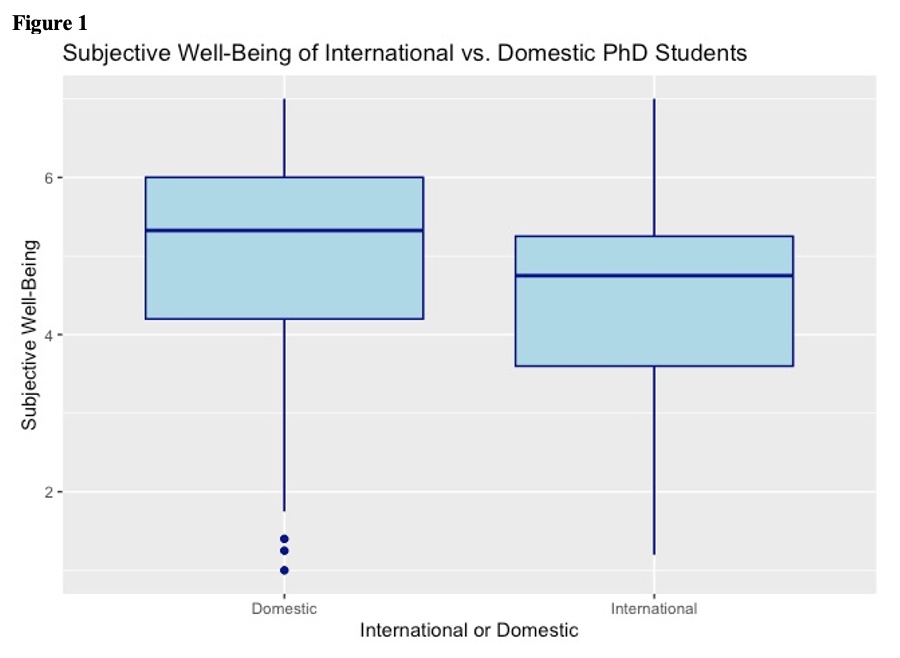College of Social and Behavioral Sciences
96 Exploring the Subjective Well-Being of International and Domestic PhD Students in STEM Fields
Hailee Davis; Jacqueline Chen; and Becky Neufeld
Faculty Mentor: Jacqueline Chen (Psychology, University of Utah)
Introduction
Science, technology, engineering, and mathematics (STEM) fields are critical to a nation’s success, so it is vital to have highly skilled individuals in these fields (Kayan-Fadlelmula et al., 2022). There is a common misconception that leaving a graduate program is tied to ability, but many students leave their graduate program for reasons such as emotional exhaustion, lack of support, and/or conflict between institutional values, expectations, or life goals (Devine & Hunter, 2017). I was interested in researching how well-being differs between international and domestic PhD students in STEM fields. Graduate students are under a lot of stress and this relates to their well-being. Graduate students are evaluated often, have paper deadlines, high workload, lack of permanent employment, pressure to publish and participate in the scholarly environment, etc. (Schmidt & Hansson, 2018). International and domestic students both experience academic stress, but there are additional stressors that are unique for international students, such as studying in a second language, being far from support networks, and navigating visa issues (Suh et al., 2021). Consistent with these differences, past research suggests that international graduate students experience higher anxiety, work-home interference, and have lower social-support than domestic students (Van Der Heijde et al., 2019).
Method
I analyzed data from an ongoing study sponsored by the National Science Foundation. The participants are students enrolled in science, technology, engineering, and mathematics (STEM) PhD programs at two large research universities in the U.S. Each participant took an intake survey when they first enrolled in the study, which was during the Fall 2020, Spring 2021, Fall 2021, or Spring 2022 semester. Recruitment spanned several years in order to obtain a large sample size. There are 267 total participants and 87 of them are international students. The majority of participants are between the ages of 22 and 30 with the youngest being 20 and the oldest being 44 (M = 25.68, SD = 3.42).
To explore the well-being of international graduate students in STEM programs, I calculated their score on the Subjective Well-Being scale (SWB; Diener et al., 1985). SWB was measured with five questions (e.g., “In most ways my life is close to my ideal”) using a 7-point Likert scale from 1 (strongly disagree) to 7 (strongly agree). A mean score was taken from the five SWB questions asked on the intake survey. Then, I ran an independent samples t-test comparing the SWB scores between international students (n = 87) and domestic students (n = 180) using the software environment, R.
Results
Table 1 lists the descriptive statistics for the Subjective Well-Being (SWB) of International and Domestic STEM PhD Students. Of the 87 International PhD students (M = 4.45, SD = 1.28) and 180 Domestic PhD students (M = 5.01, SD = 1.32), there was a significant difference between their SWB scores, t(174.92) = -3.36, p = 0.001, d = 0.44. This indicates that international students had significantly lower SWB scores than domestic students, and the effect size was moderate. Figure 1 shows that the median SWB scores for international students are lower than the median for domestic students. It also shows more outliers for domestic students on the lower end of the scale.

 Conclusion
Conclusion
International students in STEM reported lower subjective well-being than domestic students in STEM programs. This result is consistent with previous research. Our findings suggest that additional support is needed for international students in STEM PhD programs.
References
Devine, K., & Hunter, K. H. (2017). PhD student emotional exhaustion: The role of supportive supervision and self-presentation behaviours. Innovations in Education and Teaching International, 54(4), 335, https://doi.org/10.1080/14703297.2016.1174143
Diener, E., Emmons, R. A., Larsen, R. J., & Griffin, S. (1985). The satisfaction with life scale. Journal of Personality Assessment, 49(1), 71-75. https://doi.org/10.1207/s15327752jpa4901_13
Kayan-Fadlelmula, F., Sellami, A., Abdelkader, N., & Umer, S. (2022). A systematic review of STEM education research in the GCC countries: Trends, gaps and barriers. International Journal of STEM Education, 9(1), 1–24. https://doi.org/10.1186/s40594-021-00319-7
Schmidt, M., & Hansson, E. (2018). Doctoral students’ well-being: A literature review. International Journal of Qualitative Studies on Health and Well-Being, 13(1), 1508171–14. https://doi.org/10.1080/17482631.2018.1508171
Suh, H., Hong, J., Rice, K., & Kelly, V. (2021). International and domestic graduate student satisfaction with life. Journal of International Students, 12(1). https://doi.org/10.32674/jis.v12i1.2679
Van Der Heijde, C.M., Douwes, L., & Vonk, P. (2019). Mental health problems and support needs of PhD students: Bottlenecks of the PhD trajectory. European Journal of Public Health, 29(Supplement_4). https://doi.org/10.1093/eurpub/ckz186.588

